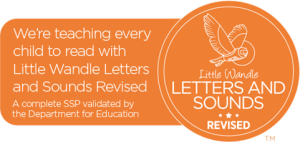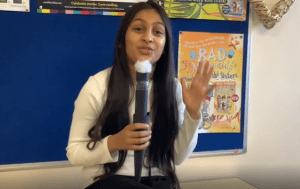Our English curriculum follows the National Curriculum 2014 and ensures that children study high- quality texts, including novels, in depth. It provides frequent opportunities for reading, learning how to apply grammar rules and studying how authors use stylistic devices for different effects. Children regularly write at length, either in response to the text they have studied or independent, stand- alone pieces. We deliver discrete phonics, handwriting, spelling and reading sessions in addition to our English lessons. Please see the English and reading policies for further information.
Phonics
Our phonics provision follows the ‘Little Wandle Letters and Sounds revised’ teaching programme and is followed from Nursery through to Year 2. From Reception to Year 2 children are taught phonics in whole class lessons with daily ‘Keep-Up’ sessions for children who need further practise. All classes use and display Little Wandle resources to provide consistency across the school. Any children who need phonics support beyond Year 2 will take part in ‘Little Wandle Rapid Catch-Up’ sessions daily.
Our Early reading provision also follows the ‘Little Wandle Letters and Sounds revised’ programme. Children are placed into ability groups and the books are carefully matched to their knowledge and skills. They take part in three reading sessions with trained staff before taking their reading book home to ‘show off’.
We deliver ‘Little Wandle’ sessions for parents to help them understand how we teach phonics and early reading and how they can support their children at home.
KS1 and 2 children in our Speech and Language Unit use ‘Cued Articulation’ to help them learn their sounds.

Subject Policies/Plans
English Policy 2024-25
Phonics Policy 2024-25
Reading skills and sentence stems
Links between reading foci and comprehension question type
Reading
Nursery Writing and Reading Progression – Thurnby 2024
Reading Progression Doc DSP
Reading Progression Doc Year 1
Reading Progression Doc Year 2
Reading Progression Doc Year 3
Reading Progression Doc Year 4
Reading Progression Doc Year 5
Reading Progression Doc Year 6
Writing
Nursery Writing and Reading Progression – Thurnby 2024
Writing Progression doc DSP 1 & 2
Writing Progression doc Year 1
Writing Progression doc Year 2
Writing Progression doc Year 3
Writing Progression doc Year 4
Writing Progression doc Year 5
Writing Progression doc Year 6
Subject Leader/s
English Lead: Mrs Lovell
Phonics and Early Reading Lead: Mrs Turland
Oracy Lead: Miss Lonsdale


















